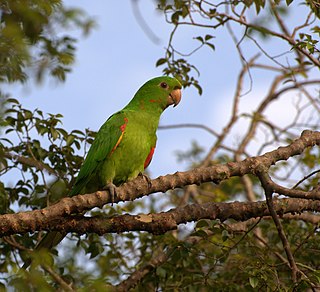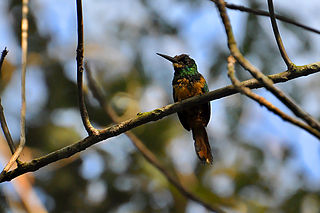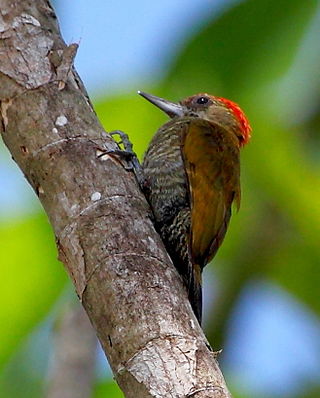
The white-eyed parakeet, known in aviculture as white-eyed conure, is a species of bird in the subfamily Arinae of the family Psittacidae, the African and New World parrots. It is found in every mainland South American country except Chile and also on Trinidad.

The swallow-winged puffbird is a species of near-passerine bird in the family Bucconidae, the puffbirds, nunlets, and nunbirds. It is also called the swallow-wing. It is found in Bolivia, Brazil, Colombia, Ecuador, French Guiana, Guyana, Peru, Suriname, and Venezuela.

The golden-winged parakeet is a species of bird in subfamily Arinae of the family Psittacidae, the African and New World parrots. It is found in Bolivia, Brazil, French Guiana, Guyana, Suriname, and Venezuela.

The cobalt-winged parakeet is a species of bird in subfamily Arinae of the family Psittacidae, the African and New World parrots. It is found in Bolivia, Brazil, Colombia, Ecuador, Guyana, Peru, and Venezuela.

The orange-chinned parakeet, also known as the Tovi parakeet, is a species of bird in subfamily Arinae of the family Psittacidae, the African and New World parrots. It is found from southern Mexico through Central America into Colombia and Venezuela.

The grey-cheeked parakeet, less commonly known as fire-winged parakeet, is a vulnerable species of bird in the subfamily Arinae of the family Psittacidae, the African and New World parrots. It is found in Ecuador and Peru.

The plain parakeet is a species of bird in subfamily Arinae of the family Psittacidae, the African and New World parrots. It is endemic to Brazil.

The cinnamon-throated woodcreeper is a sub-oscine passerine bird in subfamily Dendrocolaptinae of the ovenbird family Furnariidae. It is found in Bolivia, Brazil, Colombia, Ecuador, French Guiana, Guyana, Peru, Suriname, and Venezuela.

The pygmy antwren is a species of bird in subfamily Thamnophilinae of family Thamnophilidae, the "typical antbirds". It is found in Bolivia, Brazil, Colombia, Ecuador, French Guiana, Guyana, Peru, Suriname, and Venezuela.

The rufous-rumped foliage-gleaner is a species of bird in the Furnariinae subfamily of the ovenbird family Furnariidae. It is found in Bolivia, Brazil, Colombia, Ecuador, French Guiana, Guyana, Peru, and Suriname.

The ruddy spinetail is a species of bird in the Furnariinae subfamily of the ovenbird family Furnariidae. It is found in Bolivia, Brazil, Colombia, Ecuador, Guyana, Peru, Suriname, Venezuela, and possibly Guyana.

The bluish-slate antshrike is a species of bird in subfamily Thamnophilinae of family Thamnophilidae, the "typical antbirds". It is found in Bolivia, Brazil, and Peru.

Castelnau's antshrike is a species of bird in subfamily Thamnophilinae of family Thamnophilidae, the "typical antbirds". It is found in Brazil, Colombia, Ecuador, and Peru.

The elegant woodcreeper is a species of bird in the subfamily Dendrocolaptinae of the ovenbird family Furnariidae. It is found in Bolivia, Brazil, Colombia, Ecuador, and Peru.

The lemon-throated barbet is a species of bird in the New World barbet family Capitonidae. It is found in Bolivia, Brazil, Colombia, Ecuador, and Peru.

The white-chinned jacamar is a species of bird in the family Galbulidae. It is found in Brazil, Colombia, Ecuador, and Peru.

The golden-green woodpecker is a species of bird in subfamily Picinae of the woodpecker family Picidae. It is found in Panama and every mainland South American country except Chile and Uruguay.

The red-stained woodpecker is a species of bird in subfamily Picinae of the woodpecker family Picidae. It is found in Bolivia, Brazil, Colombia, Ecuador, Peru, and Venezuela.

The rose-fronted parakeet, known as the rose-fronted conure in aviculture, is a species of bird in the subfamily Arinae of the family Psittacidae, the African and New World parrots. It is found in Bolivia, Brazil, Ecuador, and Peru.

The western striolated puffbird is a species of bird in the family Bucconidae, the puffbirds, nunlets, and nunbirds. It is found in Bolivia, Brazil, Colombia, Ecuador, and Peru.
























